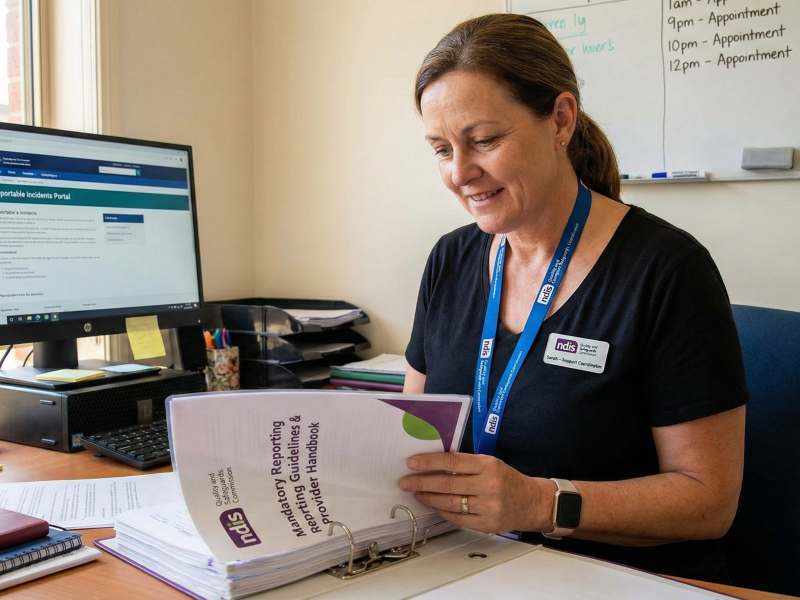NDIS Support Coordination is an Government-funded service that assists NDIS Participants to get the best out of their NDIS Plans. NDIS Support Coordinators are in close contact with the Participant they are working to coordinate support for to match them with the appropriate service Providers and coordinate appropriate support delivery, and develop the Participant’s capacity to coordinate their own supports in the long run.
Support coordination is a capacity-building NDIS support which helps Participants to:
- Understand and use their NDIS plan to pursue goals
- Connect with NDIS providers, community, mainstream and other government services
- Build confidence and skills to use and coordinate your supports.
The intention of NDIS Support Coordination is to enable NDIS Participants to have more independent, informed, and confident lives; by making sure their funded supports are being utilised effectively. Various levels of Support Coordination exist to suit the varying range of Participant needs.
How To Become an NDIS Support Coordinator?
Becoming an NDIS Support Coordinator involves a combination of relevant qualifications or experience, skills, and a working understanding of the NDIS framework. Here’s a step-by-step guide on what you need to become an NDIS Support Coordinator:
Appropriate Experience:
1. Educational Background:
While there is no fixed qualification required, most Support Coordinators come to the NDIS with backgrounds in social work, community services, psychology, nursing, or allied health. A Cert IV in Disability, Diploma in Community Services, or a Bachelor’s degree in a related field is highly recommended.
2. NDIS Understanding:
NDIS Support Coordinators must have an in-depth understanding of how the NDIS operates, to ensure they are coordinating supports appropriately, and upskilling Participants effectively. This required understanding includes Participant plans, types of funding, goals of the NDIS, and general compliance standards. This can be achieved via formal education and training courses, NDIS training modules, or practical experience within disability services.
3. Work Experience:
Prior experience in disability support, case management, or community work is greatly valued. It provides you with a solid core competency to manage complex client needs and navigate service systems.
Registration
Providers delivering NDIS Support Coordination will soon be required to be Registered with the NDIS Commission. Avaana are the industry leaders for NDIS Registration.
Apply for Roles or Open Your Own Service:
Once you are properly trained and suitable to work as a Support Coordinator, you can offer services to NDIS Participants. You don’t have to run the whole business yourself; you can work as a contractor or standard employee with other Providers.
Want to Attract More NDIS Clients?
Get expert advice on how to market your services, connect with clients, and grow your practice.
What Does an NDIS Support Coordinator Do?
An NDIS Support Coordinator directly engages with Participants to make them aware of, and act on, their NDIS Plans to ensure they receive the supports and services needed to support their disability and pursue their individual goals.
The duties of a Support Coordinator include:
- Linking Participants with service Providers who share their aspirations.
- Support with arranging service agreements and bookings.
- Overseeing the budget held under various support types.
- Supporting Participants to develop self-management capacity.
- Monitoring and reporting on plan effectiveness.
- Ironing out problems, e.g., service breakdowns or Provider conflicts.
When it comes to Specialist Support Coordination, the Coordinators work with Participants who have high degrees of complexity; often based on mental health issues, homelessness, or family disintegration. This kind of role involves assessing a combination of empathy, organisational ability, professional skills and best practice, alongside current knowledge of the NDIS.
Skills Required to Become An NDIS Support Coordinator
Although there are no required national qualifications for NDIS Support Coordinators, it is important for Support Coordinators to be fully informed of the duties and responsibilities of their role, and how to effectively support NDIS Participants with the coordination of their Supports, and upskilling of their plan management skills.
Trainings & Checks:
- Certificate IV in Disability or Community Services
- Diploma or Bachelor’s in Social Work, Psychology, Allied Health, or Human Services
- NDIS-specific training (offered through registered training organisations)
- Certain Specialist Support Coordination positions might require Working with Children Checks, NDIS Worker Screening Checks, and First Aid Certification.
Key Skills:
- Excellent communication and interpersonal skills: to communicate effectively with Participants, families, Providers, and the NDIA.
- Problem-solving skills: to deal with crises or conflicts that can occur.
- Organisational skills: to manage multiple cases, monitor funding, and meet reporting deadlines.
- Empathy and patience: to establish trust and rapport with Participants.
- Technology literacy: for the utilisation of NDIA portals, Provider management software, and online tools.
- Experience with disability services, aged care, mental health, or case management is a major benefit.
Job Prospects and Career Advancement Opportunities
The need for NDIS Support Coordinators is increasing steadily throughout Australia due to the growth of the NDIS and more Participants requiring support. The job provides employment security, flexibility, and career advancement in the disability support industry.
Support Coordinators can be employed in:
- NDIS-registered organisations
- Community service groups
- As self-employed professionals
- As you acquire more experience, you can progress to:
- Specialist Support Coordination
- NDIS Plan Management
- Team leadership positions
- Policy and program establishment roles
Besides job diversity, the fact that the position is flexible means you can work part-time, from home, or even freelance. With the right skills and commitment, a career path in NDIS Support Coordination can be both meaningful and lucrative.
How to Succeed As An NDIS Support Coordinator
A successful NDIS Support Coordinator isn’t just one who has qualifications—genuine success comes from being dependable, caring, and solution-oriented. Always make time to learn about your Participants’ aspirations, not simply their funded supports. Develop solid networks of local service Providers and remain current with policy changes in NDIS or changes in pricing arrangements.
Invest time in building report-writing, time management, and crisis resolution skills. Leverage technology to maintain simplicity, and don’t be afraid to seek help or supervision when handling complicated cases. Most effective Support Coordinators in the end are those who involve Participants as partners, rather than mere clients.
Referrals Start With Reputation – We’ll Help You Build Both
From networking tips to service refinement, we guide NDIS providers toward lasting impact.
How can Avaana assist with NDIS Registration as a Support Coordinator?
At Avaana, we make your path to becoming an NDIS Support Coordinator easier by providing Registration support, training materials, and a network of Providers to help your engagement with NDIS Participant. Avaana assists you in understanding compliance, creating your profile, and expanding your client base. We assist you to achieve success by providing you with the tools, exposure, and network you require—all under one roof.
FAQs
1. How much are Support Coordinators paid?
Australian Support Coordinators will usually earn between $35 and $55 per hour, depending on experience and whether they work full-time or as freelancers. They can earn between $65,000 and $90,000 per year, but Specialist Support Coordinators and senior professionals earn more. Freelancers will charge higher rates but also have to pay business fees such as insurance, admin, and compliance.
2. Can I be employed as a Support Coordinator part-time or work from home?
Absolutely, Support Coordination is extremely flexible. There are many part-time positions available with Providers, and some coordinators work remotely, particularly in regional or rural settings. Technology aids and NDIA portals allow case management to take place remotely. Nevertheless, infrequent face-to-face meetings or community visits might still be required, depending on the needs of the Participant.
3. How do I become successful as a Support Coordinator?
To be successful, concentrate on establishing good relationships, being dependable, and having extensive knowledge of NDIS systems. Prioritise Participants’ goals, apply structured planning tools, and act proactively to find suitable Providers. Organisational skills, clear communication, and empathy can make a difference. Ongoing learning, networking, and feedback from Participants will also improve your influence.
4. How is a Support Coordinator different from a Case Manager?
Although both work in coordinating care, Support Coordinators work within the NDIS system to assist Participants in accessing their funded supports. Case Managers work in hospitals, aged care, or community services in general, frequently without NDIS funding considerations. Support Coordinators are more concerned with Participant empowerment and support coordination, whereas Case Managers are likely more directive or supervisory in the delivery of supports.


